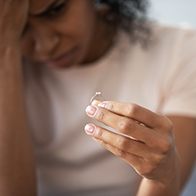Is Infidelity Natural?

To illustrate infidelity in the animal kingdom, Helen Fisher, Ph.D., a biological anthropologist and senior research fellow at the Kinsey Institute at Indiana University, recalled a classic study involving mountain bluebirds, a species that forms a monogamous pair bond much like people do. Researchers placed a stuffed model bluebird next to a nesting female while its mate was out foraging.
"When he came back and saw this interloper, he attacked the dummy bird until it fell into shreds," Fisher said. "Then he turned on the female."
The seemingly universal condemnation of infidelity is surprising when you consider the data: Estimates of unfaithfulness can vary widely depending on how the data is gathered, but even at the conservative end of the spectrum, almost a quarter (23.2 percent) of men and 19.2 percent of women have confessed to disloyalty during their current relationship, according to a 2011 survey. At the higher end, in a 1999 study, 75 percent of men and 68 percent of women admitted to some form of two-timing at some point. Interestingly, only 5 percent of people believe their partner had cheated or would ever cheat on them, a 2015 study revealed.
Fisher said she has analyzed more than 40 cultures and found incidences of affairs in every single one. Double-dealing was also common among ancient Greeks and Romans, the pre-industrial Europeans, the early Japanese, Chinese and Hindus, the traditional Inuit of the arctic, the Kuikuru of the jungles of Brazil, the Kofyar of Nigeria, the Turu of Tanzania and many other tribal cultures, according to Fisher.
Our predisposition to stray seems to be directly at odds with our tendency toward forming monogamous pair bonding. Humans evolved a "dual human reproductive strategy," as Fisher calls it: We have a powerful drive to fall in love and form a monogamous pair bond, but also have a tendency for what Fisher refers to as "clandestine adultery."
Why humans cheat
Contrary to popular psychology theories, infidelity doesn't necessarily signal relationship dissatisfaction. To illustrate this point, Fisher cited another classic study—"It's from 1985, but that doesn't matter, the brain systems remain the same," she noted—where 56 percent of men and 35 percent of women who were engaging in infidelity ranked their marriages as "happy" or "very happy."
"That means they were going out and being adulterous, even though they were in a long-term, happy partnership," she emphasized.
Straying from your marriage puts your family, friends, finances, reputation and stability on the line. Why, then, in cultures around the world, do people take the risk?
"Every reason is unique to the individual that engages in it," said Kendall Cambell, a couples therapist in Austin, Texas, who specializes in infidelity. "Some of the common themes are a desire for freedom, a desire for independence, a connection elsewhere."
Campbell said many of the reasons for stepping out on a partner can be divided into two camps. The first, perhaps more obvious camp has to do with something lacking in the relationship.
"My partner isn't providing me with enough X or Y or Z," he suggested. "I don't feel connected to them emotionally, they don't support me, we don't have enough sex."
But there's another camp where the reasoning has very little to do with the relationship and more to do with the person who engages in adultery, Campbell said. That person may think, "I look at my life and I recognize that I'm not the person who I expected or thought I was going to be," he said. "Sometimes people go out and buy a Ferrari, others engage in an affair."
As an anthropologist, Fisher is more interested in infidelity's evolutionary roots than its psychological drivers. Considering its universality across cultures—as well as among our close primate relatives, the bonobos and chimps—infidelity likely evolved in tandem with social monogamy for important adaptive reasons.
It's easy to guess why the tendency to cheat would evolve in males. An ancient, philandering man would be rewarded with more children.
"He doubles the amount of DNA he sends into tomorrow," Fisher said. "From a Darwinian perspective, that's the game; that's survival."
Unfaithful males may have disproportionately reproduced, but what would be the benefit of cheating for an ancient "philanderess," who could have only one baby per year no matter how many different sex partners they had? According to Fisher, females who mated with multiple males would have benefited from more genetically diverse offspring. They might also get additional food and resources from men they were sleeping with, in addition to an "insurance policy" in the form of parenting support if their current partner died or left them.
"Millions of years of these payoffs to both men and women—more children, insurance policy, additional resources, etcetera—[lead] to the evolution of this predisposition," Fisher concluded.
How our brain architecture enables infidelity
Perhaps thanks to these evolutionary payoffs, the brain evolved to make infidelity biologically possible. Fisher, working with a team of scientists to perform an MRI scan on the brains of people in love, has been able to prove that we've developed three distinctly different brain systems for mating and reproduction: lust, which drives us to have sex with a variety of people; romantic love, which motivates us to focus our energy on a single person to conserve time and energy; and feelings of deep attachment, which compel us to stay with a person to raise a single child through infancy.
"These three brain systems often work together, but not always," Fisher said. "You can have sex with somebody you're not in love with. You can be madly in love with somebody you've never had sex with. You can lie in bed at night and feel deep attachment to one person while the brain swings to feelings of romantic love for somebody else. You can have the feelings of the sex drive for someone you hardly know."
The flexible, combinatorial system makes it possible to be in a happy, loving relationship while, at the same time, feeling sexually attracted or even in love with someone else.
Adulterous genes
Genetics, too, play a role in influencing whether someone is likely to stray, according to Fisher. She pointed to a 2008 study of 552 married or cohabiting couples where researchers found men who had one or two copies of a certain gene in the vasopressin system—allele 334—had less stable partnerships. They were more likely to have had a marital crisis in the past year and their female partners reported less marital satisfaction, Fisher said, noting, "it was dose-dependent: the more you had of this gene, the less stable your partnership."
Another group of genes that comes into play is the major histocompatibility complex (MHC), which is part of the immune system and has been shown to play a role in sexual attraction. A 2006 study of 48 heterosexual, monogamous couples found couples who had the greatest differences in MHC were the most sexually compatible. On the other hand, in couples who shared more MHC genetic similarities, women were less sexually responsive to their partners, more attracted to other males and more likely to cheat, especially during ovulation when she's most likely to get pregnant, Fisher said.
"What's interesting about this is apparently when men and women marry who have very similar genes in this part of the immune system, it's harder to get pregnant and remain fertile," Fisher said.
However, Fisher emphasized that while certain aspects of our evolution, brain architecture and genetic makeup may predispose us to adultery, by no means are we all fated to be adulterous.
"It's a little like alcoholism," she said. "You can be predisposed to drink too much, but people choose not to, even if they're an alcoholic.
"We've got a big cerebral cortex," Fisher added. "We make decisions with our lives. We can find other people sexy, and think, 'No, I like my husband or I like my wife and I have two happy children and I'm not going to do that,'" she said.
Campbell said communication between couples can be a powerful tool for thwarting any adulterous predispositions. He advised partners to make a regular effort to communicate about the state of their relationship and ask questions, such as "How are we doing as a couple?" "Do you still feel connected to me?" or "Are we making time for physical and sexual intimacy?"
While acknowledging there's no surefire way to "infidelity-proof" a relationship, Campbell said, "Couples who reserve time for [these conversations] in their relationship tend to have the highest likelihood of success and satisfaction."




















